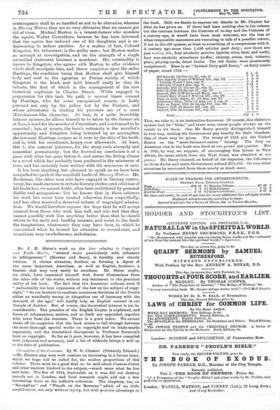Mr. J. H. Slater's work on the Law relating to
Copyright and Trade Marks, " treated more particularly with reference to infringement" (Stevens and Sons), is forcibly and clearly written. It claims attention, further, as forming a digest of the more important American, as well as English, decisions, a feature that may very easily be overdone. Mr. Slater might, we think, have contented himself with fewer illustrations from the other side of the water, without any detriment to the practical utility of his book. The fact that the American authors, even if " andoubtedly the best exponents of the law on the subject of copyright," " do not hesitate to condemn numerous decisions of the Courts either as manifestly wrong or altogether out of harmony with the demands of the age," will hardly help an English counsel in our Temple of Justice. But, of course, the theoretical interest is not inconsiderable. The practice of the English Courts is explained, and forms of informations, notices, and so forth are appended, together with texts from the statutes. There is a good index. We cannot shake off the suspicion that the book seems to fall through between the more thorough special works on copyright and on trade-marks separately, and the theoretical discussions in Professor Scrutton's book on copyright. So far as it goes, however, it has been compiled with judgment and accuracy, and a list of addenda brings it well up to the date of publication.
Chronicles of the Customs. By W. D. Chester. (Privately Printed.) —Mr. Chester may very well venture on increasing in a future issue, which we hope will be called for, the modest proportions of this volume. There must be a good deal to be said about Custom-duties and other matters kindred to the subject,—mach more what he has said here. The fire of 1814, deplorable as it was, did not destroy records not in London, and local research might add not a few interesting facts to the author's collection. The chapters, too, on " Smuggling" and " Frauds on the Revenue" admit of no little amplification, not only without injury, but with positive advantage to the book. Still, we desire to express our thanks to Mr. Chester for what he has given us. If there had been nothing else in his volume but the contrast between the Customs of to-day and the Customs of a century ago, it would have been most welcome, not the less so when responsible statesmen are venturing to talk of a possible return, if not to the old system, at least to something of a compromise with it. A century ago more than 1,400 articles paid duty ; now there are just twelve, viz., four alcoholic articles (spirits, wine, beer, and malt), four non-alcoholic stimulants (coffee, chicory, cocoa, tea), tobacco, plate, playing-cards, dried fruits. The old duties were enormously complicated. Here is an "Inward Daty-paid Entry," on forty reams
of paper, dated 1784
That, we take it, is an instructive document. Of course, this elaborate system had its " blots," and there were clever people always on the watch to hit them. One Mr. Barry greatly distinguished himself in this way, making the Government pay heavily for their blunders. One of these may be given. The treaty of 1815 put the United States on the " most-favoured-nation " footing. The duty on American rice in the husk was fixed at one pound per quarter. But in 183G, by way, we suppose, of encouraging free labour in Wezt Africa, the same article from the West Coast was admitted at one penny. Mr. Barry claimed, on behalf of the importer, the difference on these duties and made Government refund £94,6553. On two other occasions he recovered from them nearly as much more.














































 Previous page
Previous page